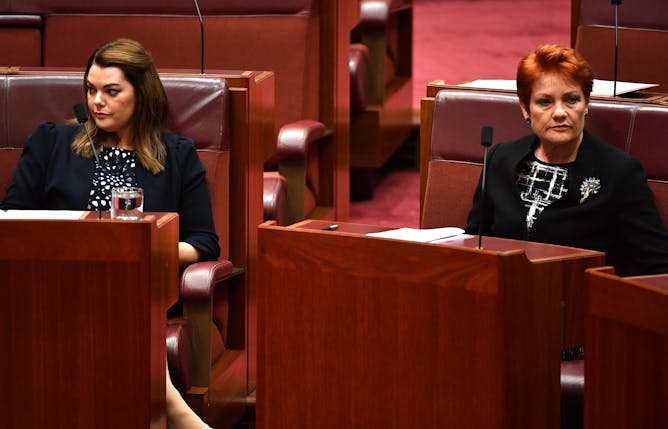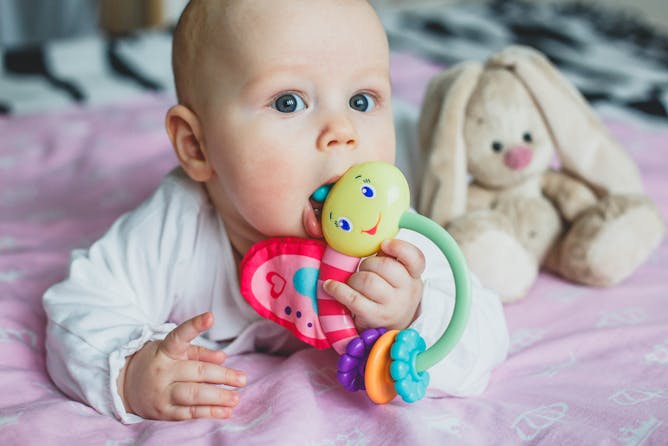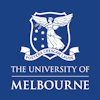|
|
|
Editor's note
|
|
Ever wondered why many companies offer bewilderingly complex and varied pricing plans? In Sydney, for instance, electricity customers can choose between 350 different retail plans. This complexity is a deliberate strategy based on knowledge that too much choice bamboozles customers into making poor choices. Robert Slonim explains how it works: more choices reduce the likelihood of making the best choice, or indeed any choice at all.
You might think smart people can weigh up mathematical evidence pretty easily. But new research from Will Grant and Matt Nurse shows your assessment of data depends on the context – and your political views. They asked Greens and One Nation supporters to do some simple maths, and found their answers changed when they were told the data was about climate change.
Teething can be a testing time for kids and their parents. But many teething products, including gels, can be dangerous or don’t help. So what’s a parent to do? Mihiri Silva explains.
Also, just a reminder we still need readers, like you, to give to our 2019 donations campaign. If you’ve already donated, thank you! If you haven’t, please give today.
|
Tim Wallace
Deputy Editor: Business + Economy
|

|
|
Top story
|

Three decades of behavioural experiments show consumers given too many choices are more likely to make a bad or no choice.
www.shutterstock.com
Robert Slonim, University of Sydney
Energy companies and other retailers bamboozle us with options to increase their profits. Here's how the behavioural phenomenon of choice overload works.
|

It seems safe to assume One Nation and Greens voters might have differing views on climate change. But can they change their minds in the face of new evidence?
Mick Tsikas / AAP
Will J Grant, Australian National University
We asked 252 Australian Greens party supporters and 252 One Nation party supporters to do some simple maths. Their answers changed when we told them it was climate change data.
|

The symptoms we put down to teething might be caused by something else. And many teething products, like gels and necklaces, might actually harm.
from www.shutterstock.com
Mihiri Silva, Murdoch Children's Research Institute
Many of the gels, toys or therapies recommended to help kids through teething may be dangerous. So, what's a parent to do?
|
Education
|
-
Luke Zaphir, The University of Queensland
The Ancient Greeks modelled a form of education that, in variants, has endured for centuries. But with climate change and globalisation, the world has changed, and the role of education with it.
-
Andrew Norton, Grattan Institute
University enrolments surged from 2012-2017 due to demand driven funding. But they were would have risen anyway, perhaps just not as quickly.
|
|
Cities
|
-
Hannah Robertson, Monash University
We now have a proven model for supporting self-determined building on Aboriginal homelands. The next question is how can its reach be extended?
-
Sunanda Creagh, The Conversation
On today's episode, Alan Morris shares some of the deeply moving stories he heard when he set out to interview older Australians in private rental accommodation and social housing about loneliness.
|
|
Arts + Culture
|
-
Richard Scully, University of New England
A New York Times decision has lead to predictions of the death of cartooning. But rather than perishing, is the global art form just feeling the full force of technological and workplace change?
-
Julienne van Loon, RMIT University
The omniscient narrator is alive and well in fiction. Kim Scott's most recent novel uses a collective narrative voice that encompasses the landscape as well as the human.
|
|
Environment + Energy
|
-
Ian Wright, Western Sydney University; Andrew Fischer, University of Tasmania; Boyd Dirk Blackwell, University of Tasmania; Qurratu A'yunin Rohmana, University of Tasmania; Simon Toze, CSIRO
Sydney's affluent eastern suburbs have raw and untreated sewage from 3,500 people discharged directly into the Tasman Sea.
-
Gregory Moore, University of Melbourne
The leaves, when boiled, can be eaten like spinach. The seeds can be roasted for a coffee substitute, and the pulp can be fermented to make beer.
|
|
Politics + Society
|
-
Benjamin T. Jones, CQUniversity Australia; John Warhurst, Australian National University
At a recent constitutional convention, high school students from across the country designed a new preamble to the Constitution to bring it into line with their idea of how Australia should be.
-
Michelle Grattan, University of Canberra
Dutton continues to insist the government could be compelled under the medevac legislation to transfer criminals, although the legislation gives the minister power to veto people on security grounds.
-
Ray Markey, Macquarie University
The latest scandal involving the CFMMEU leader has the potential to cause serious damage to the Labor Party and the union movement.
-
Michelle Grattan, University of Canberra
Another hectic week in federal politics has seen Labor dealing with a controversy involving union leader John Setka, and the Queensland government giving final approval for the Adani mine.
|
|
Business + Economy
|
-
Bertrand Venard, Audencia
2019 marks the 60th anniversary of the world's most famous doll, Barbie. It's an opportunity to look back at the journey of its creator, Ruth Handler, a visionary leader and model for women.
|
|
Science + Technology
|
-
Howard Wiseman, Griffith University
Heisenberg's famous Uncertainty Principle is put to the test to see if things really are uncertain in the quantum world.
-
Nic Rawlence, University of Otago
An Australian company's plan to mine a fossil-rich site in New Zealand to produce pig food has been described as unjustifiable vandalism. A campaign is under way to protect the site in perpetuity.
-
Stanley Shanapinda, La Trobe University
Telegram enabled protesters in Hong Kong to evade surveillance, but a DDoS attack and the arrest of a group administrator undermined the ability of protesters to organise and communicate.
|
|
Health + Medicine
|
-
Clare Collins, University of Newcastle
Researchers looked at whether it's better to eat red meat, poultry or plant protein sources for heart health. While a plant-based diet was the clear winner, red meat and white meat scored the same.
|
|
| |
Featured jobs
|

|
RMIT University — Melbourne, Victoria
|

|
La Trobe University — Ghan, Northern Territory
|

|
University of Western Australia — Mount Waverley, Victoria
|

|
University of Melbourne — Parkville, Victoria
|
|
|
|
| |
| |
| |

|
| |
| |
| |
Featured events
|

|
Melbourne University, Melbourne, Victoria, 3006, Australia — University of Melbourne
|

|
Monash University Law Chambers, 555 Lonsdale Street , Melbourne, Victoria, 3000, Australia — Monash University
|

|
The University of Sydney, Sydney, New South Wales, 2006, Australia — University of Sydney
|

|
Monash University Law Chambers, 555 Lonsdale Street, Melbourne, Victoria, 3000, Australia — Monash University
|
|
|
|
| |
| |
| |
| |
| |
|
|
|
|
|
|
|